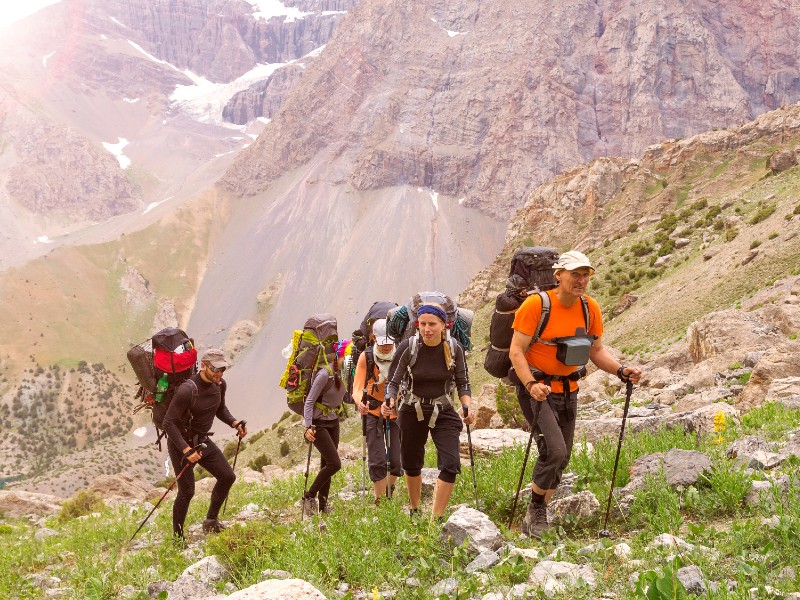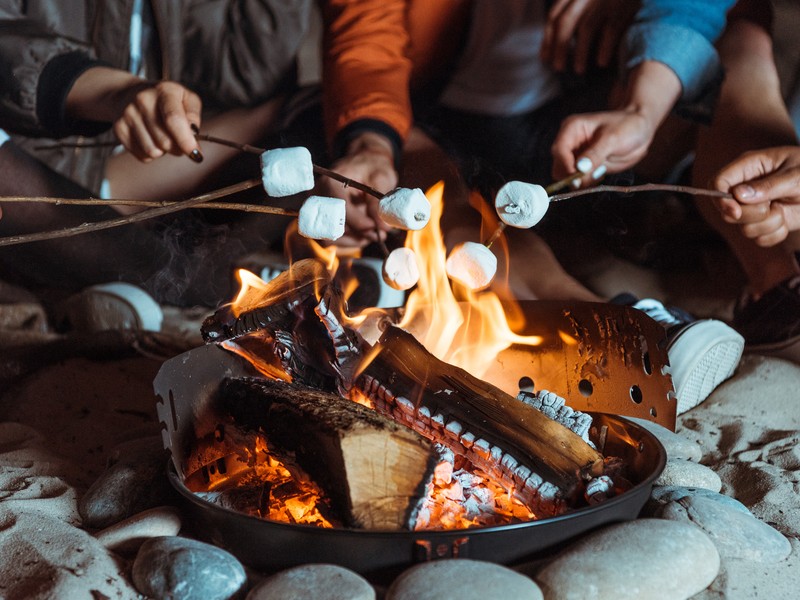Veering too far off the trail, disoriented or off course, or trying to hike alone can lead to the dangerous situation of being utterly lost in the wilderness. Though it’s depicted all the time in media, “losing yourself” in the great outdoors is not as romantic as people tend to think it is.
Before heading on a breathtaking hike, every amateur and seasoned outdoorsman should take the time to prepare in advance. Additionally, if you do get lost, you should keep in mind a general idea of what your next steps look like before panicking.
How Can You Tell if You Are Lost?
Many believe it’s “easy to know” when they get lost while hiking. However, the truth is that you often don’t know that you have no clue of the way back until it’s too late.
Backpackers and campers love the idea of getting away from the trail in order to explore deeper into the woods; however, it can be easy to lose sight of the direction back to camp this way.
One good method to tell if you are lost is to look behind you to see if you recognize the trail. If you don’t, this may be a helpful indication that it’s a good time to slow down and get your bearings.
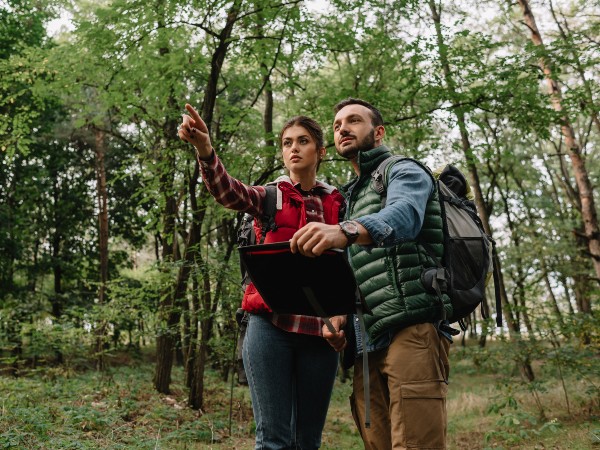
If you find that, no matter what direction you’ve turned in or how far you walk back down the trail, you seem to be making no progress in finding out where you are – don’t panic.
Panicking is the last thing you need in a situation like this.
What Happens Back at the Campsite When You Get Lost?
Getting lost while hiking is no laughing matter and happens more often than you think.
If you are staying at a campsite where you must sign in and out, the campground manager and park ranger will likely become cognizant that you are lost very soon.
Depending on your check-out date, the park manager will see that your campground site still has your items and become alerted to the possibility that you’ve become lost while hiking.
Even if your checkout date isn’t for a few days, campground hosts typically greet campers during their stay at smaller sites. If they see your site hasn’t been occupied for a while, they may start to realize that you’ve lost your way.
Usually, campgrounds that are responsible for managing long and well-publicized trails go through as much effort as possible to avoid the scenario of a camper becoming lost for an extended period.
If you do get lost at night time, you’ll need to do some dry camping.
What Can You Expect Will Happen to You When You’re Lost While Hiking?
Everyone who has been lost while hiking will have a wildly different experience. Some are more able to stay calm and well-prepared for the situation at hand.
Others will begin to panic, realizing they’ve become hopelessly lost and don’t have enough materials to help them remain calm.
If you become lost, the best thing to remain aware of is that you will likely be found in less than twenty-four hours. In fact, most trail guides and experts recommend that you stay put in generally the same area until you are found.
Those who keep wandering around aimlessly will deplete their energy or cause injury to themselves in panic. In fact, if you wander, you will probably get even more lost, confused, panicked, and harder to find.
It’s been reported that the most likely first responder to the situation is the campground manager or park ranger for the location you are staying at. Rescuers will be alerted that you are lost, and you will likely be found.
I suggest that if you go on a long hike, you bring matches with you. Because if you do get lost while hiking, you’ll have the things necessary to start a fire when it happens to get dark.
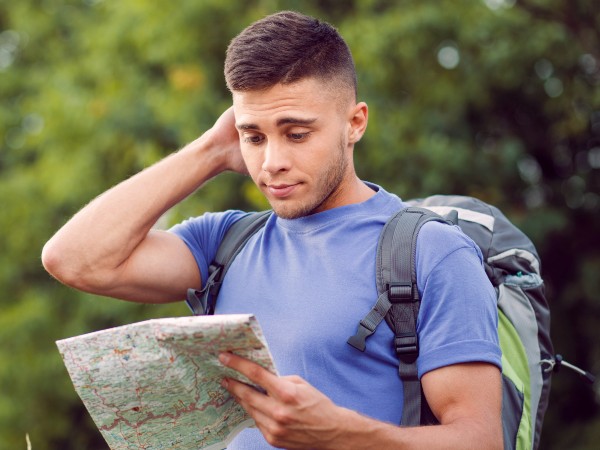
How to Prepare for Getting Lost Ahead of Time
Preparing ahead of time is the best possible way you can avoid all the confusion, discomfort, and panic that occurs while you are lost during a hike.
Here, we’ve compiled 10 tips to make even the least experienced camper a pro at nature survival.
- Always, always, always let someone know where you’re going and when you’ll return. The fastest way for a rescuer to respond to the crisis is if they are alerted as soon as possible after you’ve gotten lost. Many hikers like to leave notes on the signposts at their campground that will let others know which trail they’ve attempted to hike.
- If a trail register is available, sign in and out. These logs are checked regularly by those who manage the trail or the nearby campsite.
- Bring additional food and water; in fact, bring more than you think you need just in case you do get lost for an extended period
- Always carry a first aid kit that will help you deal with any injuries or accidents that occur while you are lost
- Make sure to charge your phone before you get on the trail. Be cognizant of the power you use for location services or data roaming since these could incur extra charges
- Bring warm clothing that you can densely pack into a backpack just in case the nights are cold
- Carry a physical copy of the trail map, compass, or handheld GPS as backup essential accessories
- Before heading out on the hike, check for the trail and campsite’s weather information
- Bring a loud, high-pitched whistle that you can blow to alert others who happen to be close by you are lost when hiking
- Bring a small water filter so that, if you find sources of water, you can stay hydrated
One popular phrase that all campers and hikers should know is the acronym “STOP.” If you are lost, you should:
- Stop – whatever you do, don’t panic. Stop walking, stay put, and remain calm. It’s likely that help is on the way or that you will get more lost by running in a panic.
- Think – Remain alert and take time to understand your situation fully. Think about the landmarks around you, where you are, and what your next steps should be. Is there low sunlight? Should you try and find shelter?
- Observe – Look for clues about the potential correct direction. Trail signs are always a good indicator of where you are.
- Plan – Make a feasible plan about how to stop being lost. If you’re tired, injured, or growing dark, it’s best to stay put until you can employ an effective strategy.
When you notice you’re lost, retrace your steps and immediately backtrack to where you just were. Whatever you do, don’t break from the trail or head in an unfamiliar direction.
Leave signs, such as heavy footprints or pieces of rope on tree branches, on the trail, which can let you know you’ve been there or let a rescue team know you are nearby.
Explore the Great Outdoors with Us!
How Do You Avoid Getting Lost When Hiking in the First Place?
The best way not to get lost while hiking is to stay on the trail at all times. If you don’t have extensive backcountry experience or know how to use a compass, it’s best to stick to well-marked areas so that you know where you’re headed.
If you absolutely must diverge from the trail, try to leave noticeable marks and be completely aware of your surroundings the whole time.
During the hike, make sure to look behind you intermittently so that you remember how the trail appears on the way back. This will help ease your mind and make sure you are on the right trail.
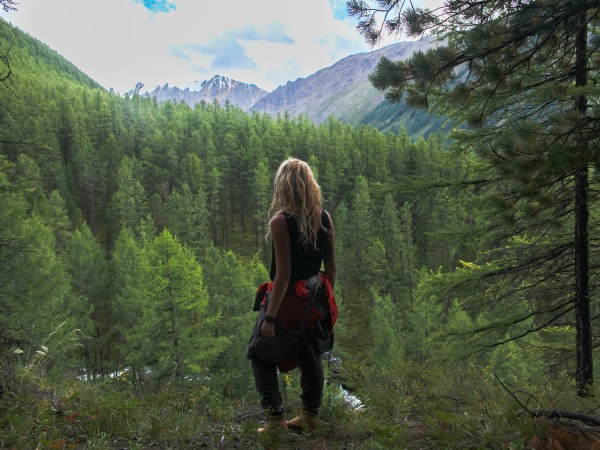
Additionally, make sure not to look down at your feet for the whole duration of the hike. Instead, take in your surroundings so that environments are easily noticeable and memorable.
If you are not that confident in your navigational abilities, try to take pictures of any trail signs you pass. This way, you are more likely to remember the specific trails you took during your outdoor adventure.
Learning to use a GPS or a physical map and compass when all else fails may also be a lifesaver. Before undertaking the hike, you should review the map and have an idea about any notable landmarks along the trail.
The Verdict
If you’re lost when hiking, there’s no need to panic when this happens. Make sure to backtrack and leave as many signs as possible that signify to rescuers you are nearby.
Before attempting to act, observe your surroundings and make a plan. Sometimes, the best course of action is to stop for the night, rest, and get your bearings when it’s light out. If you find a trail, don’t veer off of it.
For those just planning on a hike, pack emergency gear, let someone know specifically what trail you will be on, and bring navigational supplies.
Hike Safety: What to Do if You Get Lost (Video)
"Of all the paths you take in life, make sure a few of them are dirt."
-- John Muir
